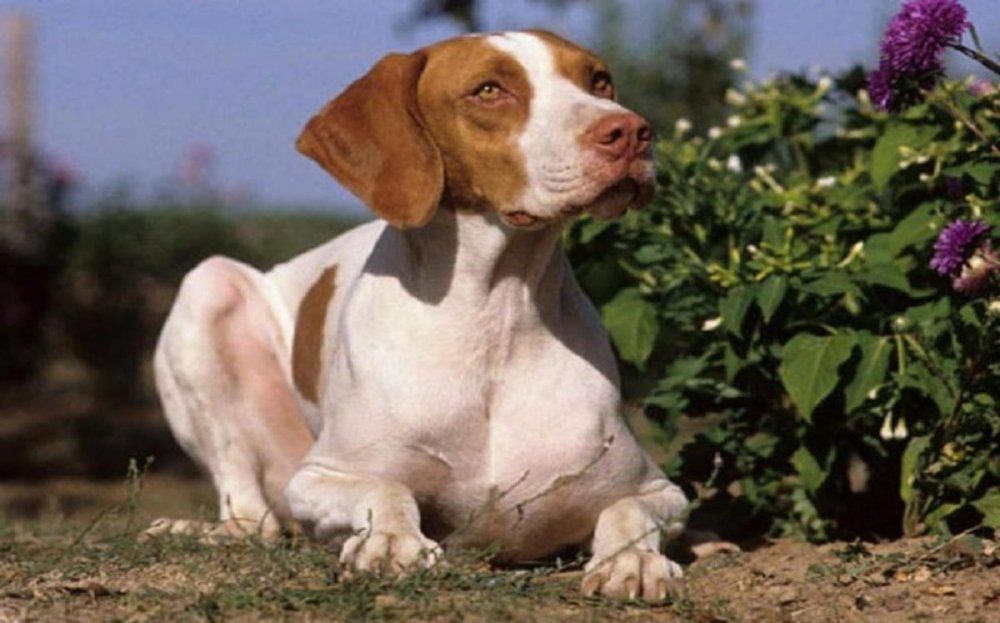- Breed Category: Sporting Group
- Country of Origin: France
- Average Height: 56-62 cm (22-24 in)
- Average Weight: 18-26 kg (40-57 lbs)
- Average Life Span: 12-14 years
- Grooming Requirements: Low; occasional brushing needed
- Exercise Requirements: High; needs daily exercise
- Coat Type: Short and dense
- Coat Color Variations: White with orange markings
- Shedding Level: Moderate
- Ear Type: Droopy
- Tail Type: Straight, medium length
- Temperament: Friendly, gentle, and sociable
- Intelligence Level: High
- Barking Tendency: Low to moderate
- Compatibility with Children: Good with children
- Compatibility with Other Pets: Generally good with other pets
- Training Ease: Relatively easy to train
- Common Health Issues: Hip dysplasia, ear infections
- Dietary Needs: Balanced diet; watch weight
- Energy Level: High energy
- Drooling Tendency: Low
- Sensitivity to Weather: Sensitive to extreme cold
- Overall Maintenance Level: Moderate
- Original Purpose: Hunting and retrieving
- Year of Recognition by Kennel Clubs: 1954
- Apartment Friendly: Not ideal for apartments
- Best Suited For: Active families, hunters
- Cost of Ownership: Moderate
- Unique Traits: Excellent scenting ability
Imagine a dog that combines the elegance of a thoroughbred horse with the loyalty of a best mate. That’s the Braque Saint-Germain for you. This breed, with its sleek coat and athletic build, is a standout in the world of hunting dogs. But there’s more to them than just looks. They’re known for their friendly nature and intelligence, making them great companions for active families.
The Braque Saint-Germain has a rich history, tracing back to the early 19th century in France. Originally bred by crossing English Pointers with French Braques, they quickly became favourites among hunters for their keen sense of smell and agility. This article will delve into their unique characteristics, storied past, and how to care for them.
Early Development and Historical Significance
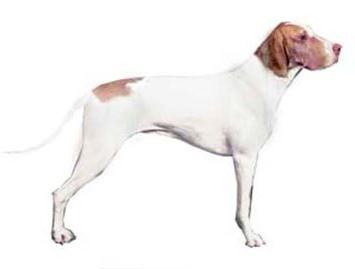
Early Development of the Breed
The Braque Saint-Germain emerged in the early 1800s, a time when hunting was both a necessity and a sport. This breed was crafted by blending the best traits of English Pointers and French Braques. The goal was to create a dog with exceptional hunting skills and a friendly disposition. The result was a breed that excelled in the field and at home, quickly gaining popularity among hunters and families alike.
Role in Hunting and Companionship
These dogs were initially bred for their hunting prowess. Their keen sense of smell and agility made them invaluable in tracking game. But they weren’t just workhorses; their friendly and intelligent nature made them perfect companions. Whether in the field or by the fireplace, they were always ready to please.
Key Historical Figures
One notable figure in the breed’s development was the Comte de L’Isle, who played a significant role in refining the breed’s characteristics. His efforts ensured that the Braque Saint-Germain maintained its reputation as a top-tier hunting dog while also being a beloved family pet.
Physical Characteristics
With a sleek, short coat and an athletic build, the Braque Saint-Germain is a picture of elegance and strength. Their expressive eyes and alert ears give them a distinctive look, while their muscular frame hints at their hunting heritage. These dogs are built for endurance and speed, making them as impressive in appearance as they are in performance.
Appearance and Unique Traits
The Braque Saint-Germain is a medium-sized dog, typically weighing between 18 to 26 kilograms. Its coat is short and sleek, predominantly white with distinctive orange markings, often around the ears and face. This gives them a striking appearance that stands out in any setting. Their athletic build is evident in their muscular frame, designed for both speed and endurance. This breed’s expressive eyes and alert ears add to their charm, making them not just functional but also visually appealing.
Temperament and Behaviour
Known for their friendly and intelligent nature, Braque Saint-Germains are great companions for active families. They thrive on interaction and are eager to please, making them easy to train. Their temperament is generally calm and gentle, but they have a playful side that loves a good romp in the park. These dogs are social creatures, getting along well with children and other pets, which makes them a versatile addition to any household.
Personality and Suitability

Typical Personality Traits
The Braque Saint-Germain is a delightful mix of gentleness, intelligence, and energy. These dogs are known for their calm and friendly nature, making them approachable and easy to get along with. Their intelligence shines through in their quick learning and problem-solving abilities, while their energy level keeps them active and engaged, perfect for families who love the outdoors.
Suitability as a Family Pet and Hunting Companion
This breed is a fantastic choice for families and hunters alike. Their friendly disposition makes them great family pets, while their hunting instincts and agility make them excellent companions in the field. They adapt well to both environments, providing loyalty and companionship wherever they are.
Interaction with Children and Other Animals
Braque Saint-Germains are social animals that thrive on interaction. They are gentle with children, often forming strong bonds with them. Their friendly nature extends to other animals, making them a harmonious addition to multi-pet households.
Training and Exercise Needs
Training a Braque Saint-Germain is usually a breeze due to their eagerness to please and intelligence. They respond well to positive reinforcement and enjoy learning new commands. Regular exercise is essential to keep them happy and healthy, so daily walks and playtime are a must.
Training, Exercise, and Health
Importance of Early Training and Socialisation
Getting your Braque Saint-Germain started with training and socialisation early on is crucial. These dogs are naturally friendly and intelligent, but early exposure to different environments, people, and other animals helps them grow into well-rounded adults. It sets the foundation for a confident and adaptable companion.
Recommended Training Techniques
Positive reinforcement is the way to go with this breed. They respond well to praise, treats, and play, making training sessions enjoyable for both of you. Consistency is key, so keep sessions regular and engaging. Their eagerness to learn means they’ll pick up commands quickly, making training a rewarding experience.
Daily Exercise Requirements and Activities They Enjoy
These dogs are active and need daily exercise to stay happy and healthy. Think long walks, runs, or even a game of fetch. They love activities that challenge their agility and intelligence, so mix it up with some interactive games or agility training. Keeping them physically and mentally stimulated is essential.
Health and Lifespan
The Braque Saint-Germain is generally a healthy breed, with a lifespan of around 12 to 14 years. Regular vet check-ups, a balanced diet, and plenty of exercise will help keep them in top shape. Like any breed, they can be prone to certain health issues, so staying informed and proactive is important.
Health and Care
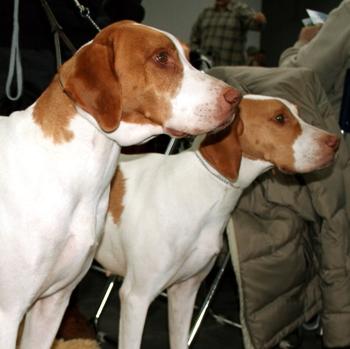
Common Health Issues
While the Braque Saint-Germain is generally healthy, they can be prone to hip dysplasia and ear infections. Regular vet visits are crucial to catch any issues early. Keeping an eye on their weight and ensuring they have a balanced diet can help prevent joint problems.
Average Lifespan and Health Tips
These dogs typically live between 12 to 14 years. To keep them healthy, ensure they get plenty of exercise and mental stimulation. A nutritious diet tailored to their activity level is essential. Regular check-ups with the vet will help maintain their health and catch any potential issues early.
Preventative Care Recommendations
Preventative care is key. Regular vaccinations, flea and tick prevention, and dental care are all important. Keep their ears clean to avoid infections, especially if they spend a lot of time outdoors. A proactive approach to their health will ensure they live a long, happy life.
Grooming and Maintenance
Their short coat is low-maintenance, requiring only occasional brushing to remove loose hair. Regular baths will keep them clean, especially after outdoor adventures. Don’t forget to trim their nails and check their ears regularly to prevent any issues.
Coat Care and Grooming Routines
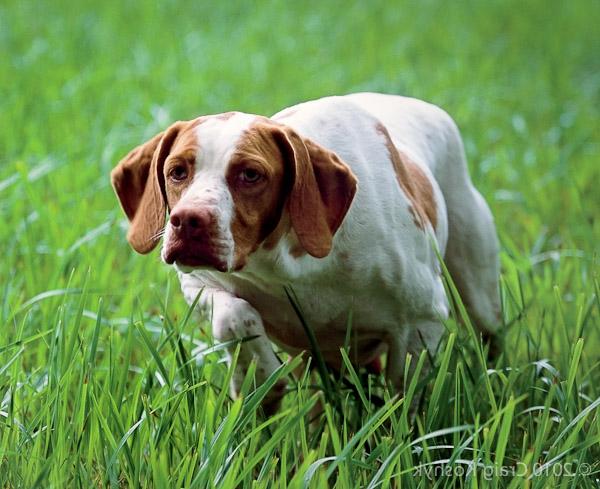
Shedding and Seasonal Grooming Tips
The Braque Saint-Germain’s sleek coat is pretty low-maintenance, but it does shed, especially during seasonal changes. A quick brush once or twice a week will help manage loose hair and keep their coat looking its best. During shedding seasons, you might want to up the brushing to a few times a week to keep your home fur-free.
Regular baths aren’t necessary unless they’ve had a particularly muddy adventure. When you do bathe them, use a gentle dog shampoo to maintain their skin’s natural oils. Don’t forget to check their ears regularly for any signs of infection, especially if they’re often outdoors.
Diet and Nutrition
Feeding your Braque Saint-Germain a balanced diet is crucial for their health and energy levels. Look for high-quality dog food that matches their activity level. These dogs are active, so they need a diet rich in protein to support their muscles and overall health.
Keep an eye on their weight, as obesity can lead to joint issues. Treats are fine in moderation, but make sure they don’t make up more than 10% of their daily intake. Fresh water should always be available to keep them hydrated, especially after exercise.
Nutritional Needs and Feeding Guidelines

Nutritional Needs for Optimal Health
For the Braque Saint-Germain, a balanced diet is key to maintaining their energy and health. These active dogs thrive on high-quality dog food rich in protein, which supports their muscular build and overall vitality. Look for foods that include essential fatty acids for a shiny coat and joint health.
Foods to Include and Avoid
Include lean meats, fish, and vegetables in their diet. These provide the necessary nutrients without unnecessary fillers. Avoid foods high in artificial additives, sugars, and excessive grains, as these can lead to health issues like obesity and allergies.
Feeding Schedules and Portion Recommendations
Feed your Braque Saint-Germain twice a day to maintain their energy levels. Portion sizes should be adjusted based on their activity level and age. Puppies require more frequent, smaller meals, while adults can have larger portions. Always consult with your vet for personalised advice.
Fun Facts and Trivia
Did you know the Braque Saint-Germain was once a favourite among French royalty? Their noble lineage and hunting prowess made them a prized companion in the courts. Despite their regal history, they remain down-to-earth and love a good game of fetch just as much as a royal hunt.
Interesting Tidbits and Famous Braque Saint-Germain Dogs
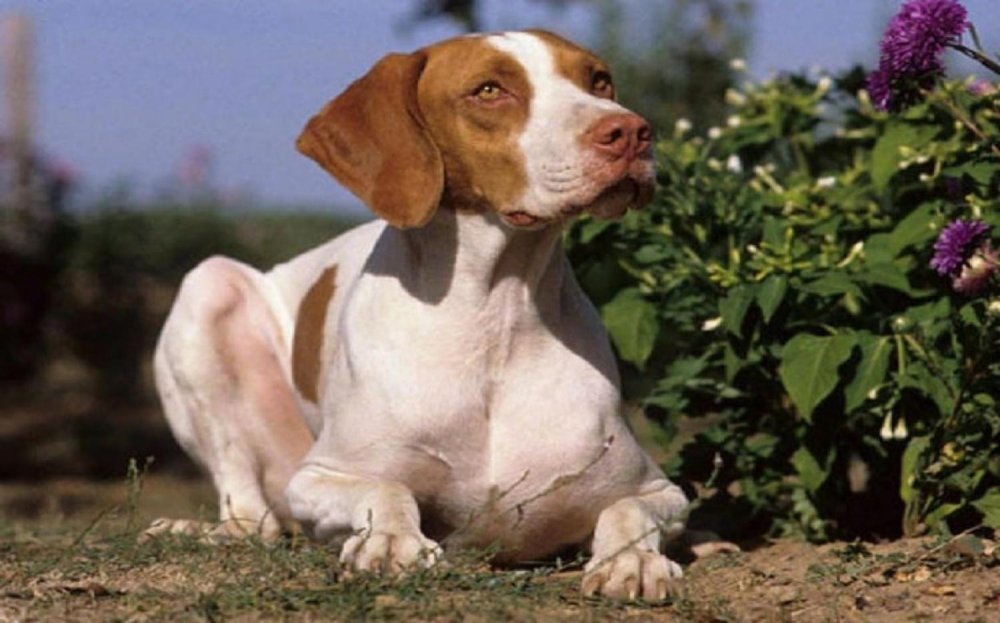
Interesting Tidbits about the Breed
The Braque Saint-Germain is a breed with a fascinating history and some unique quirks. Did you know that these dogs were originally bred for the French aristocracy? Their noble roots are evident in their elegant appearance and dignified demeanour. Despite their aristocratic beginnings, they are incredibly down-to-earth and love nothing more than a good romp in the park.
Another interesting fact is their exceptional sense of smell. This trait makes them not only excellent hunting companions but also great at scent-based games and activities. Their intelligence and eagerness to please mean they excel in various dog sports, from agility to obedience trials.
Famous Braque Saint-Germain Dogs in Media or History
While the Braque Saint-Germain may not be as widely recognised in media as some other breeds, they have made their mark in history. One notable Braque Saint-Germain was owned by the Comte de L’Isle, who was instrumental in refining the breed’s characteristics. His dedication to the breed helped cement its reputation as a top-tier hunting dog and a beloved family pet.
Though not often seen on the silver screen, their striking appearance and friendly nature make them a favourite in dog shows and competitions, where they often steal the spotlight with their grace and agility.
Final Thoughts
The Braque Saint-Germain is a versatile and elegant companion. With its rich history and friendly nature, this breed excels both as a hunting partner and a family pet. Balancing high energy with a gentle temperament, it offers a rewarding experience for active families and hunters alike. Embrace the unique traits and care needs of the Braque Saint-Germain to enjoy a fulfilling relationship with this remarkable breed. Consider welcoming this noble and energetic dog into your life for a blend of companionship and adventure.
